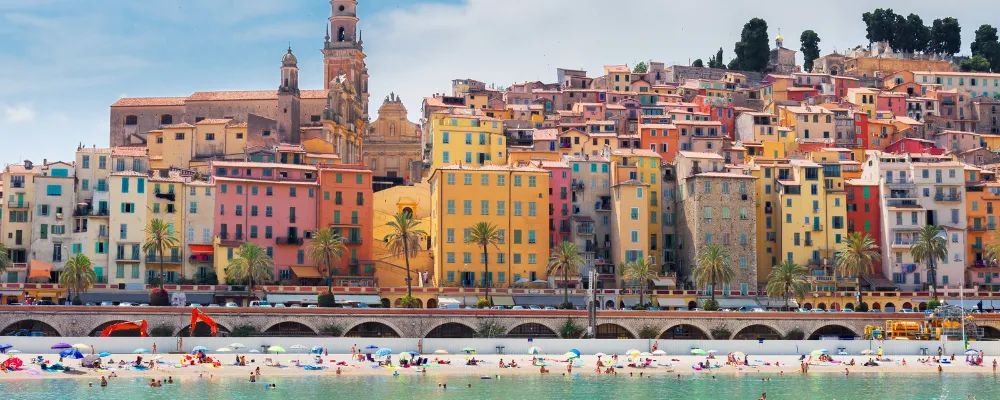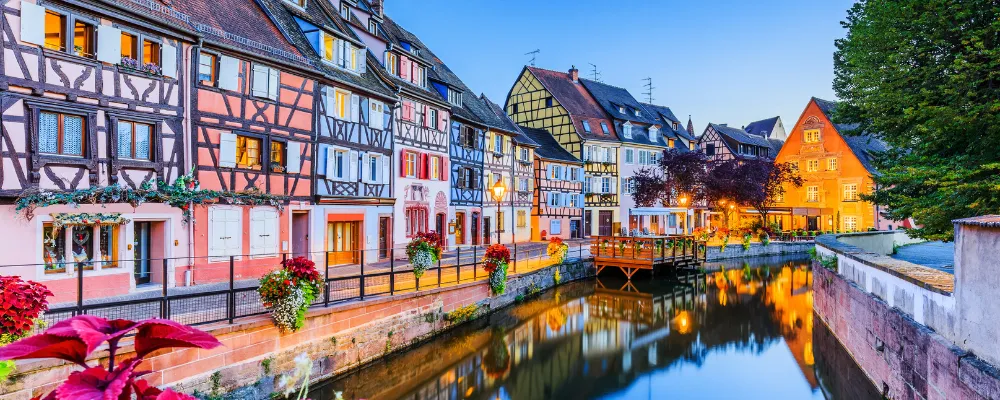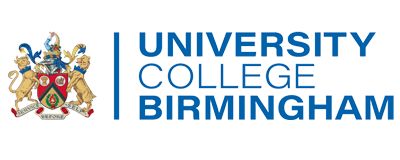10 reasons to study in France for higher studies in France for Nepalese students:

Certainly! Here are ten reasons why Nepalese students may consider studying in France for higher education:
- Quality Education: France is renowned for its high-quality education system, with prestigious universities and Grandes Écoles consistently ranked among the best in the world.
- Wide Range of Programs: French universities offer a diverse range of academic programs across various disciplines, providing Nepalese students with ample choices to pursue their academic interests and career goals.
- Affordable Tuition Fees: Compared to other popular study destinations, France offers relatively affordable tuition fees for international students, making higher education more accessible and cost-effective.
- Scholarship Opportunities: French government scholarships, as well as scholarships offered by universities and organizations, provide financial assistance to talented Nepalese students, helping them pursue their studies in France.
- Cultural Immersion: Studying in France allows Nepalese students to immerse themselves in French culture, language, and way of life, enriching their personal and academic experiences.
- Global Networking: France’s central location in Europe and its multicultural environment provide Nepalese students with opportunities to network with peers, professionals, and academics from around the world, enhancing their global perspective and connections.
- Research Opportunities: France is a hub for research and innovation, offering Nepalese students access to cutting-edge research facilities, laboratories, and collaborations with renowned scholars and scientists.
- Language Learning: Studying in France provides Nepalese students with the opportunity to improve their French language skills, which can enhance their employability and open doors to opportunities in French-speaking countries and organizations.
- Career Prospects: A degree from a French university is highly regarded worldwide, increasing Nepalese students’ employment prospects and competitiveness in the global job market.
- Quality of Life: France offers a high standard of living, with a rich cultural heritage, excellent healthcare system, and well-developed infrastructure, providing Nepalese students with a comfortable and rewarding living experience.
Overall, studying in France offers Nepalese students a combination of academic excellence, cultural immersion, career opportunities, and quality of life, making it an attractive destination for higher education.
What are the popular courses for Nepalese students studying abroad in France?

Nepalese students studying abroad in France pursue a diverse range of courses across various academic fields. Some of the popular courses for Nepalese students studying abroad in France include:
- Engineering: France is known for its prestigious engineering schools and universities offering programs in disciplines such as mechanical engineering, civil engineering, electrical engineering, computer science, aerospace engineering, and chemical engineering.
- Business Administration and Management: French business schools and universities offer internationally renowned programs in business administration, management, finance, marketing, entrepreneurship, and international business, providing students with valuable skills and insights for success in the global business world.
- Hospitality Management and Tourism: With France being a top destination for tourism and hospitality, Nepalese students often pursue courses in hotel management, tourism management, hospitality operations, culinary arts, and event management to gain expertise in this thriving industry.
- Fashion Design and Luxury Management: France is synonymous with fashion and luxury, attracting students interested in fashion design, fashion merchandising, luxury brand management, fashion marketing, and textile design to study at renowned fashion schools and institutions in cities like Paris.
- Art and Design: French art schools and universities offer programs in fine arts, graphic design, interior design, product design, animation, and digital media, providing opportunities for Nepalese students to unleash their creativity and pursue careers in the creative industries.
- Culinary Arts and Gastronomy: With France’s rich culinary heritage, Nepalese students interested in culinary arts, gastronomy, wine studies, and hospitality management often choose to study in France to learn from master chefs and gain hands-on experience in French cuisine.
- Agriculture and Environmental Sciences: France is renowned for its agricultural expertise and commitment to sustainable development. Nepalese students interested in agriculture, environmental sciences, agribusiness, forestry, and sustainable agriculture find excellent opportunities to study in France.
- International Relations and Political Science: Given France’s prominent role in international affairs and diplomacy, Nepalese students interested in international relations, political science, diplomacy, and global governance choose to study in France to gain insights into global issues and policy-making processes.
- Language and Linguistics: France is a hub for language studies, offering courses in French language and linguistics for students interested in mastering the French language or pursuing careers in translation, interpretation, language teaching, or language research.
- Science and Technology: French universities excel in scientific research and innovation, offering programs in fields such as biology, chemistry, physics, mathematics, computer science, and biotechnology, attracting Nepalese students with a passion for STEM disciplines.
These are just some of the popular courses for Nepalese students studying abroad in France. With its world-class educational institutions, diverse academic offerings, vibrant cultural scene, and global opportunities, France provides an enriching experience for Nepalese students pursuing higher education abroad.
Famous cities in France for abroad education for Nepalese students:

France is renowned for its excellence in higher education and offers numerous cities with world-class universities and institutions that attract international students, including those from Nepal. Some of the famous cities in France known for their educational offerings and quality of life for abroad education include:
Paris: As the capital and largest city of France, Paris is a global center for education, culture, and innovation. It is home to several prestigious universities and Grandes Écoles, including Sorbonne University, Sciences Po, and École Polytechnique. With its rich history, vibrant arts scene, and diverse student population, Paris offers a stimulating environment for academic pursuits and cultural exploration.
Lyon: Located in east-central France, Lyon is known for its culinary excellence, historic architecture, and thriving student community. It is home to institutions such as Université Claude Bernard Lyon 1, Université Lumière Lyon 2, and École Normale Supérieure de Lyon. Lyon offers a dynamic academic environment with opportunities for interdisciplinary studies and research.
Toulouse: Situated in southwestern France, Toulouse is renowned for its aerospace industry, research institutions, and cultural heritage. It is home to institutions such as Université Toulouse 1 Capitole, Université Toulouse – Jean Jaurès, and Toulouse Business School. Toulouse offers a blend of academic excellence, innovation, and quality of life for international students.
Bordeaux: Located in the Nouvelle-Aquitaine region of southwestern France, Bordeaux is famous for its wine industry, historic landmarks, and world-class education. It is home to institutions such as Université de Bordeaux, KEDGE Business School, and Bordeaux Sciences Agro. Bordeaux offers a conducive environment for academic and personal growth, with opportunities for research and cultural immersion.
Grenoble: Situated in southeastern France, Grenoble is known for its scientific research institutions, technological innovation, and picturesque surroundings in the French Alps. It is home to institutions such as Université Grenoble Alpes, Grenoble Ecole de Management, and Grenoble INP – Institute of Engineering. Grenoble offers a stimulating academic environment with a focus on science, engineering, and innovation.
Strasbourg: Located near the border with Germany, Strasbourg is known for its blend of French and German culture, historic landmarks, and renowned educational institutions. It is home to institutions such as Université de Strasbourg, Strasbourg Business School, and École Nationale d’Administration. Strasbourg offers a multicultural environment with opportunities for academic excellence and cross-cultural exchange.
These cities, among others in France, offer a wide range of academic programs, research opportunities, and cultural experiences for Nepalese students pursuing higher education abroad. Prospective students should consider factors such as program offerings, location, cost of living, and student support services when choosing a city for their abroad education in France.
What are the eligible criteria to study in France for Nepalese students?

The eligibility criteria for Nepalese students to study in France can vary depending on the level of study (undergraduate, graduate, or doctoral) and the specific requirements of the chosen university or institution. However, some general eligibility criteria typically apply for Nepalese students or any international students wishing to study in France:
Academic Qualifications: Nepalese students are usually required to have completed their previous level of education with satisfactory grades. This may include a high school diploma (for undergraduate programs), a bachelor’s degree (for graduate programs), or a master’s degree (for doctoral programs). The specific academic requirements may vary depending on the university and program.
Language Proficiency: For programs taught in French, proficiency in the French language is typically required. International students may need to provide evidence of French language proficiency through standardized tests such as the DELF or DALF. However, many universities in France also offer programs taught in English, for which proficiency in English may be required instead.
Entrance Exams or Interviews: Some universities or programs may require applicants to take entrance exams or participate in interviews as part of the admissions process. These exams or interviews may assess the applicant’s academic knowledge, skills, and suitability for the program.
Valid Passport: Applicants must have a valid passport for the duration of their stay in France.
Health Insurance: International students are usually required to have health insurance coverage for the duration of their studies in France. This can either be arranged through the university or obtained independently.
Financial Resources: Applicants may need to demonstrate sufficient financial resources to cover tuition fees, living expenses, and other related costs during their stay in France. This could include bank statements, scholarship awards, or financial sponsorship letters.
Visa Requirements: Nepalese students, like other international students, typically need to obtain a student visa or residence permit to study in France. This may involve submitting various documents, including the university’s acceptance letter, proof of accommodation, proof of financial resources, and health insurance.
It’s important for prospective students to carefully review the specific requirements of the universities and programs they are interested in, as these may vary. Additionally, consulting with the university’s admissions office or the French embassy or consulate in Nepal can provide more detailed information and guidance on the application process and eligibility criteria.
How do I apply for a scholarship in France for Nepalese students?

Applying for a scholarship in France as a Nepalese student involves several steps. Here’s a general guide on how to apply for scholarships:
- Research Scholarships:
Start by researching scholarship opportunities available to international students studying in France. These scholarships may be offered by French government agencies, international organizations, French universities, or other institutions. Websites like Campus France, ScholarshipPortal, and individual university websites are valuable resources for finding scholarships. - Check Eligibility Criteria:
Carefully review the eligibility criteria for each scholarship to ensure that you meet the requirements. Criteria may include academic merit, financial need, field of study, country of origin, and other factors. Some scholarships may also have specific eligibility requirements for Nepalese students. - Prepare Required Documents:
Gather all the necessary documents required for the scholarship application. This may include academic transcripts, letters of recommendation, a statement of purpose or personal essay, proof of English or French proficiency, and any other supporting documents specified by the scholarship provider. - Submit Applications:
Complete and submit the scholarship applications by the specified deadlines. Pay close attention to the application instructions and ensure that all required documents are included. Some scholarships may have online application portals, while others may require submission by mail or email. - Follow Up:
After submitting your scholarship applications, monitor your email and other communication channels for updates or requests for additional information from the scholarship providers. Be prepared to respond promptly and provide any additional documentation if required. - Prepare for Interviews (if applicable):
Some scholarship programs may require applicants to participate in interviews as part of the selection process. If you are selected for an interview, prepare by practicing common interview questions and researching the scholarship provider and its objectives. - Await Notification:
Once you have submitted your scholarship applications and completed any required interviews, await notification regarding the status of your application. Scholarship providers typically inform applicants of their decision within a certain timeframe. - Accept Scholarship Offers:
If you are awarded a scholarship, carefully review the terms and conditions of the award, including any requirements or obligations you must fulfill as a scholarship recipient. Follow the instructions provided to accept the scholarship offer and complete any necessary paperwork. - Apply for Student Visa (if applicable):
If you are awarded a scholarship and plan to study in France for more than three months, you will need to obtain a student visa from the French embassy or consulate in Nepal. Follow the visa application process and ensure that you meet all requirements.
By following these steps and actively seeking out scholarship opportunities, Nepalese students can increase their chances of securing financial assistance to pursue their studies in France. It’s essential to start the scholarship search and application process well in advance of the intended study period to allow ample time for preparation and submission. Additionally, seeking guidance from educational advisors or the French embassy or consulate in Nepal can provide valuable assistance in navigating the scholarship application process.
What are the job opportunities for Nepalese students in France?

Nepalese students studying in France have access to various job opportunities during and after their studies. Some of the job opportunities for Nepalese students in France include:
Part-Time Jobs: Nepalese students with a valid student visa are allowed to work part-time while studying in France. They can work up to 964 hours per year, which equates to around 20 hours per week during term time. Part-time job opportunities may include roles in retail, hospitality, customer service, tutoring, and administrative support.
Internships: Many French universities and companies offer internship opportunities for students to gain practical work experience in their field of study. Nepalese students can explore internships related to their academic interests, which can enhance their skills, expand their professional network, and potentially lead to future job opportunities.
Graduate Employment Programs: After completing their studies, Nepalese students may be eligible for graduate employment programs offered by French companies or multinational corporations. These programs provide structured training, mentorship, and entry-level positions for recent graduates, allowing them to kickstart their careers in France.
Post-Study Work Visa: Nepalese students who graduate from a French institution may be eligible for a temporary residence permit (APS – Autorisation Provisoire de Séjour) that allows them to work in France for up to 24 months after completing their studies. This post-study work visa enables Nepalese students to gain professional experience in their field and explore career opportunities in France.
Skilled Migration Pathways: France offers various skilled migration pathways for international students who wish to settle in the country permanently. Nepalese students with qualifications and work experience in high-demand occupations may be eligible to apply for a skilled worker visa (such as the Talent Passport or European Blue Card) to live and work in France long-term.
Entrepreneurship and Self-Employment: Nepalese students with entrepreneurial aspirations can explore opportunities to start their own businesses or freelance careers in France. The country’s supportive startup ecosystem, access to funding, and favorable business environment make it an attractive destination for entrepreneurs.
Language Teaching: Nepalese students proficient in French or English may consider opportunities to teach their native language to French students or offer language tutoring services. Language teaching can be a rewarding part-time job or side gig for Nepalese students looking to share their linguistic skills and earn extra income.
Research and Academic Positions: Nepalese students interested in pursuing further studies or research in France may find opportunities to work as research assistants, teaching assistants, or academic staff in universities, research institutions, or laboratories. These positions can provide valuable experience in academia and contribute to the advancement of knowledge in their field.
Overall, France offers a wide range of job opportunities for Nepalese students, both during and after their studies. By leveraging their skills, qualifications, language proficiency, and networking abilities, Nepalese students can explore diverse career paths and build successful careers in France
What is the best time for Nepalese students to apply in the New France for higher education?

Nepalese students studying in France have access to various job opportunities during and after their studies. Some of the job opportunities for Nepalese students in France include:
- Part-Time Jobs: Nepalese students with a valid student visa are allowed to work part-time while studying in France. They can work up to 964 hours per year, which equates to around 20 hours per week during term time. Part-time job opportunities may include roles in retail, hospitality, customer service, tutoring, and administrative support.
- Internships: Many French universities and companies offer internship opportunities for students to gain practical work experience in their field of study. Nepalese students can explore internships related to their academic interests, which can enhance their skills, expand their professional network, and potentially lead to future job opportunities.
- Graduate Employment Programs: After completing their studies, Nepalese students may be eligible for graduate employment programs offered by French companies or multinational corporations. These programs provide structured training, mentorship, and entry-level positions for recent graduates, allowing them to kickstart their careers in France.
- Post-Study Work Visa: Nepalese students who graduate from a French institution may be eligible for a temporary residence permit (APS – Autorisation Provisoire de Séjour) that allows them to work in France for up to 24 months after completing their studies. This post-study work visa enables Nepalese students to gain professional experience in their field and explore career opportunities in France.
- Skilled Migration Pathways: France offers various skilled migration pathways for international students who wish to settle in the country permanently. Nepalese students with qualifications and work experience in high-demand occupations may be eligible to apply for a skilled worker visa (such as the Talent Passport or European Blue Card) to live and work in France long-term.
- Entrepreneurship and Self-Employment: Nepalese students with entrepreneurial aspirations can explore opportunities to start their own businesses or freelance careers in France. The country’s supportive startup ecosystem, access to funding, and favorable business environment make it an attractive destination for entrepreneurs.
- Language Teaching: Nepalese students proficient in French or English may consider opportunities to teach their native language to French students or offer language tutoring services. Language teaching can be a rewarding part-time job or side gig for Nepalese students looking to share their linguistic skills and earn extra income.
- Research and Academic Positions: Nepalese students interested in pursuing further studies or research in France may find opportunities to work as research assistants, teaching assistants, or academic staff in universities, research institutions, or laboratories. These positions can provide valuable experience in academia and contribute to the advancement of knowledge in their field.
Overall, France offers a wide range of job opportunities for Nepalese students, both during and after their studies. By leveraging their skills, qualifications, language proficiency, and networking abilities, Nepalese students can explore diverse career paths and build successful careers in France.










